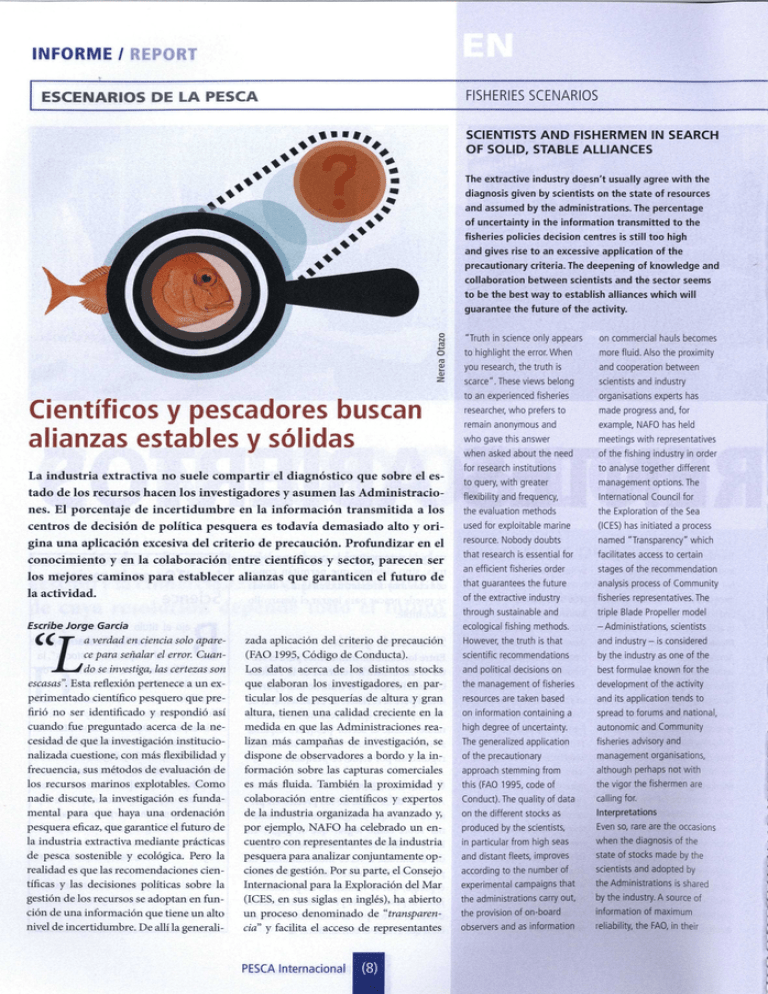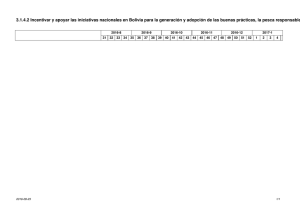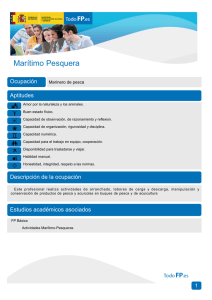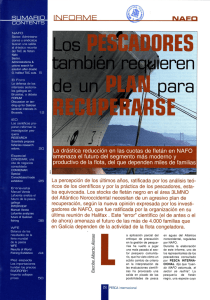Pesca Internacional, ISSN 1699-3691
Anuncio

INFORME / REPORT ESCENARIOS DE LA PESCA FISHERIES SCENARIOS SCIENTISTS AND FISHERMEN IN SEARCH OF SOLID, STABLE ALLIANCES The extractive industry doesn't usually agree with the diagnosis given by scientists on the state of resources and assumed by the administrations. The percentage of uncertainty in the information transmitted to the fisheries policies decision centres is still too high and gives rise to an excessive application of the precautionary criteria. The deepening of knowledge and collaboration between scientists and the sector seems to be the best way to establish alliances which will guarantee the future of the activity. "Truth in science only appears to highlight the error. When you research, the truth is scarce". These views belong Científicos y pescadores buscan alianzas estables y sólidas La industria extractiva no suele compartir el diagnóstico que sobre el estado de los recursos hacen los investigadores y asumen las Administraciones. El porcentaje de incertidumbre en la información transmitida a los centros de decisión de política pesquera es todavía demasiado alto y origina una aplicación excesiva del criterio de precaución. Profundizar en el conocimiento y en la colaboración entre científicos y sector, parecen ser los mejores caminos para establecer alianzas que garanticen el futuro de la actividad. Escribe Jorge García C,L a verdad en ciencia solo aparece para señalar el error. Cuando se investiga, las certezas son escasas". Esta reflexión pertenece a un experimentado científico pesquero que prefirió no ser identificado y respondió así cuando fue preguntado acerca de la necesidad de que la investigación institucionalizada cuestione, con más flexibilidad y frecuencia, sus métodos de evaluación de los recursos marinos explotables. Como nadie discute, la investigación es fundamental para que haya una ordenación pesquera eficaz, que garantice el futuro de la industria extractiva mediante prácticas de pesca sostenible y ecológica. Pero la realidad es que las recomendaciones científicas y las decisiones políticas sobre la gestión de los recursos se adoptan en función de una información que tiene un alto nivel de incertidumbre. De allí la generali- zada aplicación del criterio de precaución (FAO 1995, Código de Conducta). Los datos acerca de los distintos stocks que elaboran los investigadores, en particular los de pesquerías de altura y gran altura, tienen una calidad creciente en la medida en que las Administraciones realizan más campañas de investigación, se dispone de observadores a bordo y la información sobre las capturas comerciales es más fluida. También la proximidad y colaboración entre científicos y expertos de la industria organizada ha avanzado y, por ejemplo, NAFO ha celebrado un encuentro con representantes de la industria pesquera para analizar conjuntamente opciones de gestión. Por su parte, el Consejo Internacional para la Exploración del Mar (ICES, en sus siglas en inglés), ha abierto un proceso denominado de "transparencia" y facilita el acceso de representantes PESCA Internacional (8) lo an experienced fisheries researcher, who prefers ro remain anonymous and who gave this answer when asked about the need for research institutions to query, with greater flexibility and frequency, the evaluation methods used for exploitable marine resource. Nobody doubts that research is essential for an efficient fisheries order that guarantees the future of the extractive industry through sustainable and ecological fishing methods. However, the truth is that scientific recommendations and political decisions on the management of fisheries resources are taken based on information containing a high degree of uncertainty. The generalized application of the precautionary approach stemming from this (FAO 1995, code of Conduct). The quality of data on the different stocks as produced by the scientists, in particular from high seas and distant fleets, improves according to the number of experimental campaigns that the administrations carry out, the provision of on-board observers and as information on commercial hauls becomes more fluid. Also the proximity and cooperation between scientists and industry organisations experts has made progress and, for example, NAFO has held meetings with representatives of the fishing industry in order to analyse together different management options. The International Council for the Exploration of the Sea (ICES) has initiated a process named "Transparency" which facilitates access to certain stages of the recommendation analysis process of Community fisheries representatives. The triple Blade Propeller model —Administrations, scientists and industry — is considered by the industry as one of the best formulae known for the development of the activity and its application tends to spread to forums and national, autonomic and Community fisheries advisory and management organisations, although perhaps not with the vigor the fishermen are calling for. Interpretations Even so, rare are the occasions when the diagnosis of the state of stocks made by the scientists and adopted by the Administrations is shared by the industry. A source of information of maximum reliability, the FAO, in their latest evaluation of the state and related commentaries, of resources, establish that of which transmit clear 441 commercial species, 4% objectivity from a guaranteed are under-exploited (greater source, have often been used fishing effort is permissible); to show exactly the opposite 21% are moderately exploited of what they intend. (higher production can be Ah l the actors in fisheries obtained through greater have to assume that al the fishing effort); 47% are fully information on the state of exploited (near maximum the resources is characterised and control measures are by a high percentage of required); .18% are over- uncertainty and that this exploited (fishing effort must be reduced by means has to be reduced); 9% are of more in depth knowledge. exhausted (hauls are aboye Within the extractive industry the maximum sustainable there is a profound state of production levels and mistrust with regard to the therefore require population efficiency of the resource de la industria pesquera comunitaria a determinadas etapas del proceso de análisis de sus recomendaciones. El modelo de triple hélice —Administraciones, científicos e industria— es valorado por el sector pesquero como una de las mejores fórmulas conocidas para mejorar el desarrollo de la actividad y su aplicación tiende a extenderse a foros y organismos consultivos y de decisión pesquera de ámbitos estatal, Las decisiones sobre gestión de los recursos se toman con información que tiene incertidumbres autonómico y comunitario, aunque no con todo el dinamismo que reclaman los pescadores. recovery). Finally, 1% of evaluation methods used and the stocks are in a pirase of which is considered criticism recovery (these are the cases of their work by the scientific Interpretaciones in which either there is no community. Nothing could Aún así, son escasas las ocasiones en que el diagnóstico sobre el estado de los recursos que hacen los científicos y es asumido por las Administraciones es excessive fishing effort or be further from the truth. that profitability cannot be The fishermen are becoming guaranteed). This information more and more interested in compartido por la industria. Una fuente de datos de la máxima fiabilidad, la FAO, en su última valoración del estado de los recursos establece que de 441 especies comerciales, el 4% están infra-explotadas (es permisible una mayor presión pesquera); el 21% son moderadamente explotadas (se podría producir más mediante un mayor esfuerzo de pesca); el 47% están plenamente explotadas (en niveles cercanos al máximo y requieren medidas de control); el 18% se encuentran sobre-explotadas (hay que reducir la capacidad de pesca); el 9% de los stocks están agotados (las capturas están por encima del máximo rendimiento sostenido y precisa, en consecuencia, reposición de poblaciones). Finalmente, el 1% de los stocks se encuentran en fase de Cartografíe el fondo marino con Olex El mejor sistema de cartografiado en 3D para navegación y mapeado del fondo marino Boxee Trerk Herreaue Boum Profile $ettp Peet trgle Leyere 183122 6327.581N I 1r2.5.504 E Cource 360° 1.0 lamo aorre..r.ere. ,,e• -.1 o emulen 1.1.2 O Idenn - " 2100 1011 •Ntrgssiit.‘;.. .z. "Ir • Revolucionario sistema de mapeado y presentación 3D del lecho marino • Utiliza las mejores cartas vectorizadas disponibles en el mercado • Manejo intuitivo de las funciones de plotter; para todo tipo de modalidades pesqueras • Ampliación gradual, extremadamente rápida • Puede conectarse a una amplia gama de instrumentos y sensores de a bordo • Usado, en todo el mundo, por más de 3000 profesionales de la pesca _V • 41•16 4111. Camera 40 miiin above nula. aa a s Eig 2 Vd144, 5J 1 xtfkl IX Distribuidores Olex: Simrad Spain S.L. Tel +34 966 810 149 comercial(a simrad com 41111-4r 4W1 Navico Marine Electronics S.L. Olex desvele los secr ei,o s Kk1Ar4e'-a Olex Tel +34 902 350 750 olex(dnavico.es Olex AS N-7462 'I'rondheim Norway Tel +47 73 54 61 99 E-mail olex@olex.no Internet www.olex.no INFORME / REPORT ESCENARIOS DE LA PESCA recuperación (son los casos en los que o bien no se tiene presión excesiva o bien no se puede garantizar la rentabilidad económica). Estos datos y sus respectivos comentarios, que transmiten una serena objetividad y proceden de una fuente inobjetable, han sido interpretados con frecuencia para demostrar lo contrario de lo que expresan. Hay que asumir, todos los actores de la pesca deberían asumir, que la información sobre el estado de los recursos está caracterizada por un alto porcentaje de incertidumbre, que es necesario reducir mediante una profundización del conocimiento. En la industria extractiva existe un extendido estado de opinión de recelo sobre el grado de eficacia de los métodos de evaluación de los recursos, que la comunidad científica interpreta como de crítica a su trabajo. Nada más lejos. Los pescadores están cada vez más interesados en establecer alianzas estables y sólidas con los investigadores, porque una de las finalidades principales de su trabajo FISHERIES SCENARIOS es hacer sostenible la explotación para garantizar el futuro de la actividad. Un ejemplo en este sentido lo proporciona la credibilidad que para la flota de palangre de superficie gallega que captura pez espada tiene el asesoramiento científico, lo que se ha materializado en una pesca responsable, disciplinada con el recurso y respetuosa con el medio ambiente marino. Por último, el enfoque ecosistémico que adoptan los comités y otros organismos de investigación marina de referencia para las Administraciones, añadirá complejidad a la comprensión de los procesos y algunos investigadores han pronosticado que será difícil hacer recomendaciones de gestión que satisfagan a todos. Pero sobre lo que no existen dudas es que el cumplimiento de las medidas de gestión que se dictan en los centros políticos de decisión pesquera, estará garantizado cuando la industria comparta plenamente el diagnóstico sobre el estado real de los recursos y haya participado activamente en su elaboración. ,/, "Profet Policy" analizará en Vigo la protección de los ecosistemas marinos Se debatirán las interacciones de la acuicultura y de la pesca extractiva con el medioambiente marino y la necesidad de complementar la investigación en esta materia Manuel Liria. Carmela Porteiro. ientíficos y expertos de las Administraciones públicas y del C sector privado participarán en Vigo en el taller del "Profet Policy" sobre "Integración de la Pesca y la Acuicultura en la Protección del Medioambiente Marino", coordinado por las organizaciones de productores OPPC-3 y OPPF-4 y que Javier Garat. tendrá lugar en Vigo durante los días 20 y 21 de noviembre. Como ya se informó, ambas OPPs, integradas en la Cooperativa de Armadores de Pesca del Puerto de Vigo (ARVI), han asumido la gestión de ese encuentro por encargo de la Asociación Europea de Organizaciones de Productores (EAPO, en sus siglas en inglés). PESCA Internacional (10) establishing stable alliances with researchers, as one of the main objectives of their work is to provide sustainable exploitation and so guarantee the future of the activity. An example of this can be seen in the credibility of scientific advice for the Galician swordfish surface long linar fleet and which has materialised in responsible, disciplined fishing with regard "PROFET POLICY" TO ANALYSE IN VIGO THE PROTECTION OF MARINE ECOSYSTEMS The interactions of aquaculture and extractive fishing with the marine environment will be analysed as well ass the need for further research mm n this matter. Finally, the ecosystem approach adopted by Scientists and experts from the Public Administrations and the private sector will be taking part in Vigo in the "Profet committees and other marine research organisations and considered a reference point Policy" workshop on "The Integration of Fishing and Aquaculture in the Protection by the Administrations, adds even greater complexity to the understanding of the processes and soma researchers are forecasting of the Marine Environment", coordinated by the producer organisations OPPC-3 and to the resources and respectful of the marine environment. that it is going to be very difficult to make management recommendations that satisfy everyone. However, cae thing is absolutely citar; compliance with the management regulations as dictated by fisheries policy decision Javier Pereiro. making centres, will be guaranteed when the industry fully agrees with the diagnosis of the true state of resources and has actively participated in the drawing up of these regulations. OPPF-4 which will be held in Vigo from the 20th to the 21st of November. As has been reported earlier, both OPP's integrated in the Vigo Fishing Boat Owners Cooperativa (ARVI), have taken on the management of this meeting as requested by the European Association of Fish Producers Associations (EAPO). The main objective of the Community initiative "Profet Policy" is to circulate the results of studies undertaken and financed by the V and VI R&D+i framework programmes. Protection of marine ecosystems will be the central theme of the meeting which will count en a panel of speakers including General Secretary of the European Federation of Aquiculture Producers and coordinator of the "Profet Policy", Courtney Hough, who will be talking about the objectives of this initiative and latest developments in this field during the first session dedicated to "Regional Development and the Role of Research". Carmen Paz-Martí, specialist from the Spanish Secretariat General for the view on marine environment 'protection. Sea, will be talking about the criteria and procedures, in the international field in order to protect marine ecosystems. A representative of the The conference will be open to questions and debate in order to enrich tire content and the opening session will be given over to providing a reflexion DG-Mare European Commission, Leticia Martinez, will be talking about tire on the focus towards planning and research within the European States in order to establishment of tire Red favour regional collaboration in these matters. Natura 2000 for the marine environment. During the inaugural session, Carmela Porteiro (1E0) will be talking about the "Application of the Ecosystem Approach to Fisheries Management ". The final paper in this section will be gi yen by Javier Garat, manager of the Spanish Confederation of Fisheries (CEPESCA), who will explain the fishing sector's point of Questions and debate Interaction between fishing and aquaculture with the marine environment will be dealt with in the afternoon session and the speakers will be Kostas Kalamantis who will explaining tire point of view of tire NGO's, Fernando Otero, on behalf of Galician producers La iniciativa comunitaria "Profet Policy" tiene como principal objetivo difundir los resultados de los estudios realizados y financiados por el V y VI programas marcos de I+D+i. La protección de los ecosistemas marinos será el tema central del encuentro que cuenta con un panel de ponentes en el que figuran Hough Courtney, el coordinador del "Profet Policy" y secretario nes, en el campo internacional, para la protección de los ecosistemas marinos. Una representante de la Comisión Europea-DG Mare, Leticia Martínez, tiene encomendado explicar las orientaciones para el establecimiento de la Red Natura 2000, en el medio ambiente marino. En la misma sesión matutina e inaugural del seminario también esta prevista la intervención de la investigadora Car- Los pescadores saben que el trabajo de los científicos garantiza el futuro de su actividad general de la Federación Europea de Productores de Acuicultura, quien explicará los objetivos de esa iniciativa y el desarrollo de la investigación en este campo, durante la primera sesión dedicada al and Maria Longares from the "Desarrollo Regional y el Papel de la Investigación". Carmen Paz-Martí, experta molluscs producers. Opinions from continental aquaculture de la secretaría general del Mar española, hablará sobre los criterios y las actuacio- mela Porteiro (ICES), que hablará de la "Aplicación del Enfoque Ecosistémico a la Gestión Pesquera". La última de las ponencias de este apartado será la del directivo de la Confederación Española de Pesca (CEPESCA), Javier Garat, quien proporcionará la visión de la industria extractiva sobre la protección del medio ambiente marino. El motor Anglo Belgian Corporation, N.V. Tel.: 986 101 783 Fax: 986 101 645 Mail: br@abcdiesel.be Web: www.abcdiesel.be INFORME / -EPORT FISHERIES SCENARIOS ESCENARIOS DE LA PESCA Preguntas y debate El desarrollo de este seminario está abier- to a preguntas y al debate para enriquecer sus contenidos, y la sesión introductoria estará dedicada a generar una revisión del enfoque de la planificación y la investiga- ción en el ámbito europeo y de los Esta- dos miembros, para favorecer la comple- mentariedad regional en estas materias. La interacción entre la pesca y la acui- cultura con el medioambiente marino será abordada en la sesión vespertina y los ponentes serán el belga Kostas Ka- lamantis, quien expondrá el punto de vista de las ONGs, Fernando Otero, por los productores gallegos de rodaballo y María Longares, por los productores de moluscos. Las opiniones de la acuicul- tura continental y de la pesca costera y artesanal también se conocerán durante el desarrollo de esta sesión. El segundo y último día del seminario estará dedicado a la "Sostenibilidad de los Ecosistemas Marinos en Europa" y están and costal traditional fishing will also be developed during programadas las intervenciones del investigador Javier Pereiro (IE0), quien hablará del planteamiento científico y del directivo pesquero (CEPESCA), Manuel Liria quien explicará los "Efectos sociales this session. The final day of the conference will be concerned y económicos de la gestión del ecosistema marino". Esas y otras intervenciones previstas están dirigidas a definir la necesidad de una gestión del conocimiento en estas materias y acerca de cómo la actividad acuícola y extractiva abordan esta cuestión. La sesión de clausura del taller estará centrada en la evaluación de las necesidades de investigación en la que se presentará el VII Programa Marco de investigación en I+D+i de la Unión Europea. Entre los ponentes figura Jaques Fuchs de la DG Mar de la Comisión Europea, entre otros expertos.4, with "Sustainability of Marine Ecosystems in Europe" with contributions from Javier Pereiro (1E0), who will be follow-up analysis, which act as indicators on the reliability of the adjustments, were at effects of marine ecosystem management." These and other contributions are aimed at describing the necessity for a management policy in these matters and how fishing and aquaculture activities fit into the equation. The closing session of the workshop will be centred FernandoTorrent and Jaques Fuchs from the Europen Commission. Instituto de Investigaciones Marinas (CSIC) a duda sobre los resultados que ofrece el Comité Científico de la NAFO es un tema recurrente y muy preocupante para el sector pesquero. Somos los propios científicos L los primeros en transmitir esta inseguridad que, aunque para nosotros es esencial y permanente pues es inherente al propio proceso de estimación estadística, puede ser interpretada como desconfianza, que no es el caso. No obstante, la duda es en ocasiones mayor de lo habitual, tal es el caso de los resultados sobre el fletán negro presentados este ario, y ello requiere una reflexión. Muchos de los participantes en el Consejo Científico de la NAFO en junio de 2008 no quedamos muy contentos con el asesoramiento que ofrecíamos. Aunque los métodos seguidos están plenamente comprobados y la información disponible es amplia, los análisis retrospectivos, que son indicadores de la bondad del ajuste, eran malos: la mortalidad por pesca habría sido sobreestimada en los últimos arios y la abundancia subestimada, y éste era el tercer ario en el que ocurría ese mismo sesgo. Debo aclarar que los criterios para la aceptación de una determinada formulación no tienen en cuenta aquellos resultados más importantes sino determinadas propiedades que definen la calidad del ajuste. En otras palabras, no se acepta un resultado por su coherencia con lo que es esperado o deseado, sino por las mejores propiedades estadísticas del proceso de cálculo y de sintonía con toda la información disponible. PESCA Internacional proven and the available information extensive, the point of view and Manuel Liria who will be explaining the "Social and economic VII European Union R&D+i Framework Programme will be presented. The speakers will be Luc van Hoof, Antonio Vázquez of lune 2008 were not happy with the advice which we offered. Although the methods followed were fully talking from the scientific on analysing the need for research and in which the Asesoramiento científico, una reflexión crítica and this must be addressed. Many of the participants in the NAFO Scientific Council SCIENTIFIC ADVICE, SOME CONSIDERATIONS Antonio Vázquez, Marine Research Institute (CSIC) Doubts cast on the results offered by the NAFO Scientific Committee are a constant and worrying matter for the fisheries sector. We scientists are the first to transmit this uncertainty which, although for us is essential and permanent, is an inherent part of statistical estimation and which, fault: fishing mortality would have been overestimated in recent years and the abundance underestimated, and this is the third year in which this bias has occurred. I would like to point out that the criteria for accepting a particular formulation do not take into account the most important results but rather certain properties which define the adjustment quality. In other words, a result is not accepted for its coherence with that expected or desired, but rather for the best statistical properties of the calculus process and in harmony with all the available information. At present great effort is being put ihto improving the statistical analysis methods and to determine the confidence margins of the results, a job which is being carried out at an international and national level and where the coordinating efforts of the ICES Work Group on Methods for the Assessment of Fish Populations is worthy of note. For this reason the discussion is being held in an open forum in which every new proposal although this is not the case, can be interpreted as distrust. However, these doubts are at times greater than usual, such is the case with the will be welcome and with which the NAFO Scientific Council is fully in agreement. The analytical method at present in use, the XSA or Extended Survival Analysis, results of the Greenland halibut presented this year, was incorporated loto NAFO for the first time for


